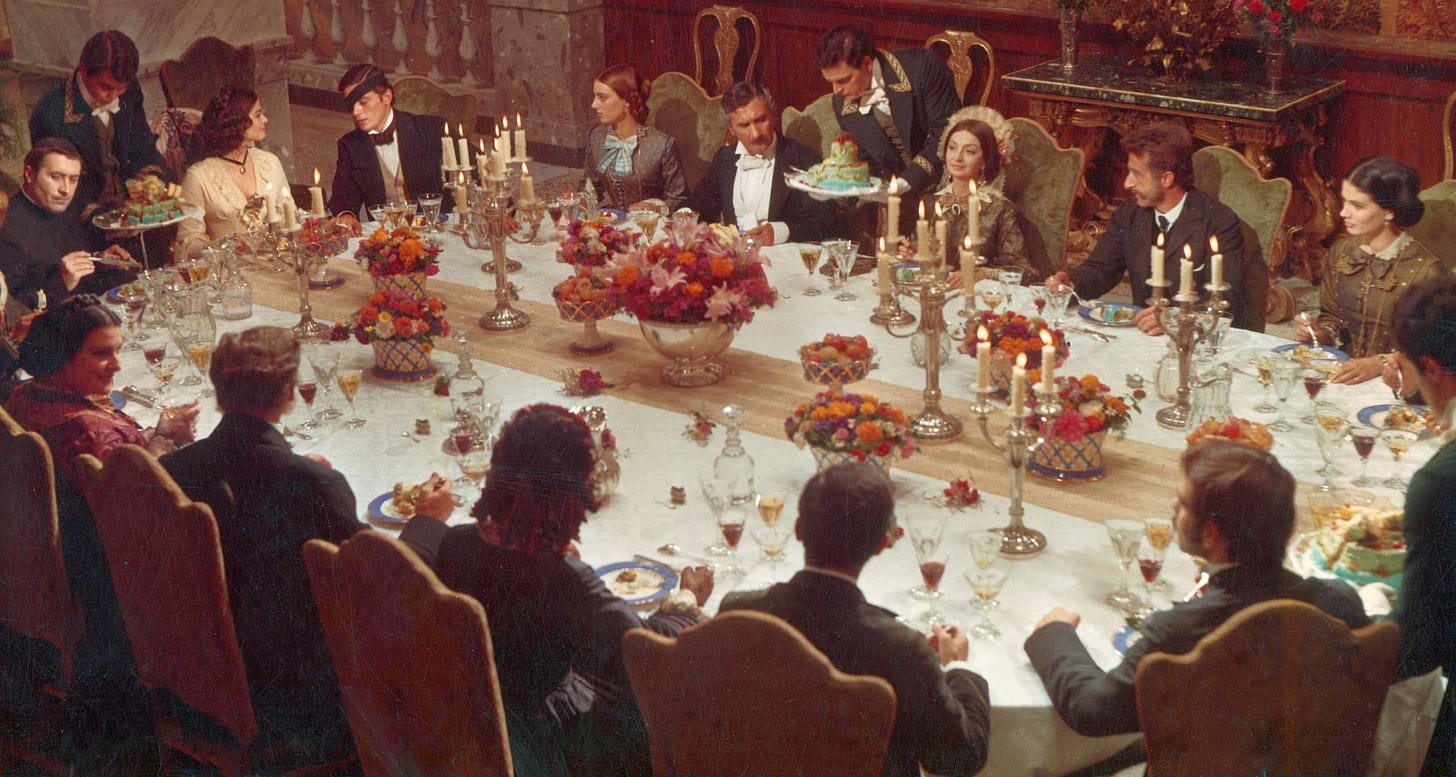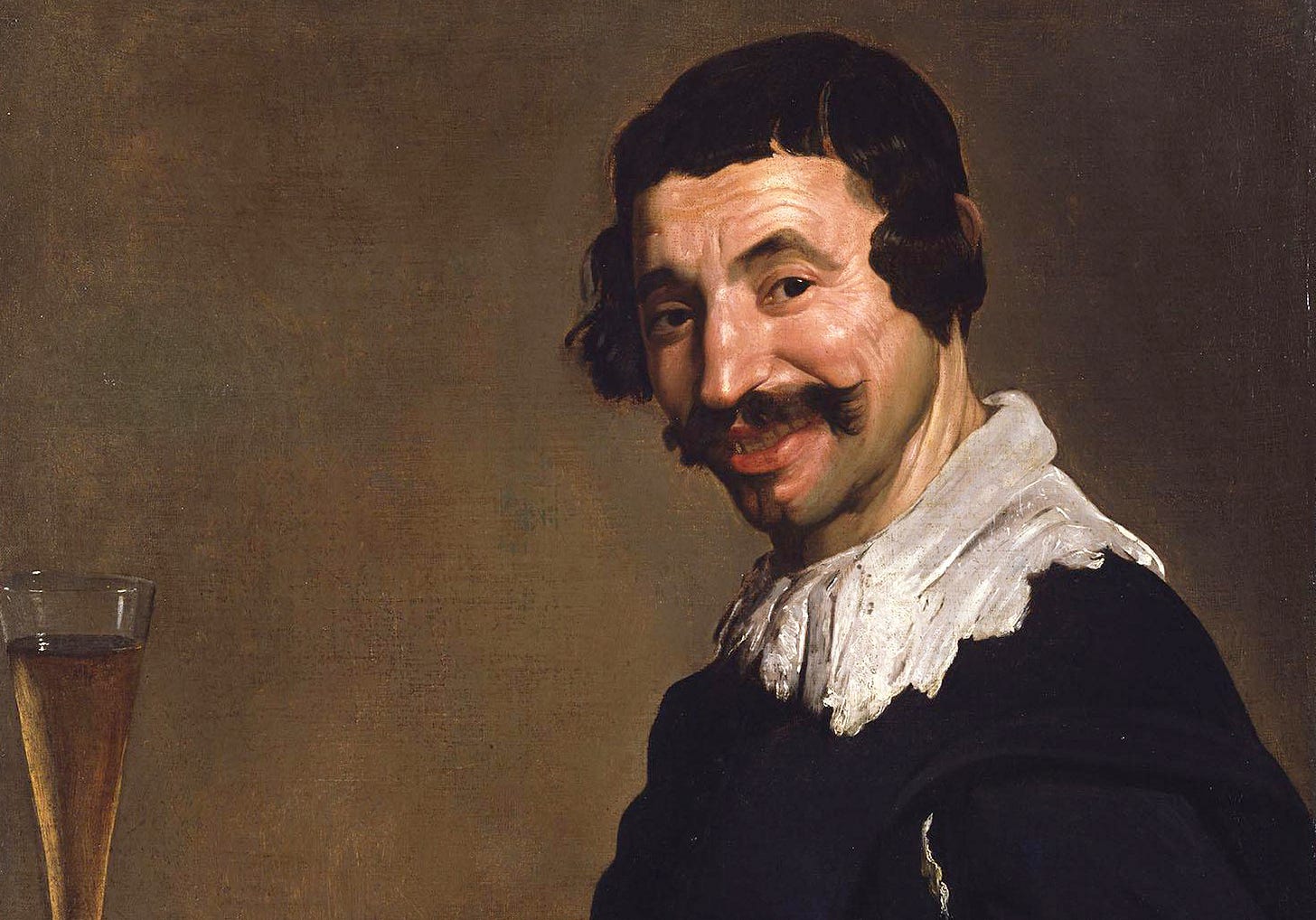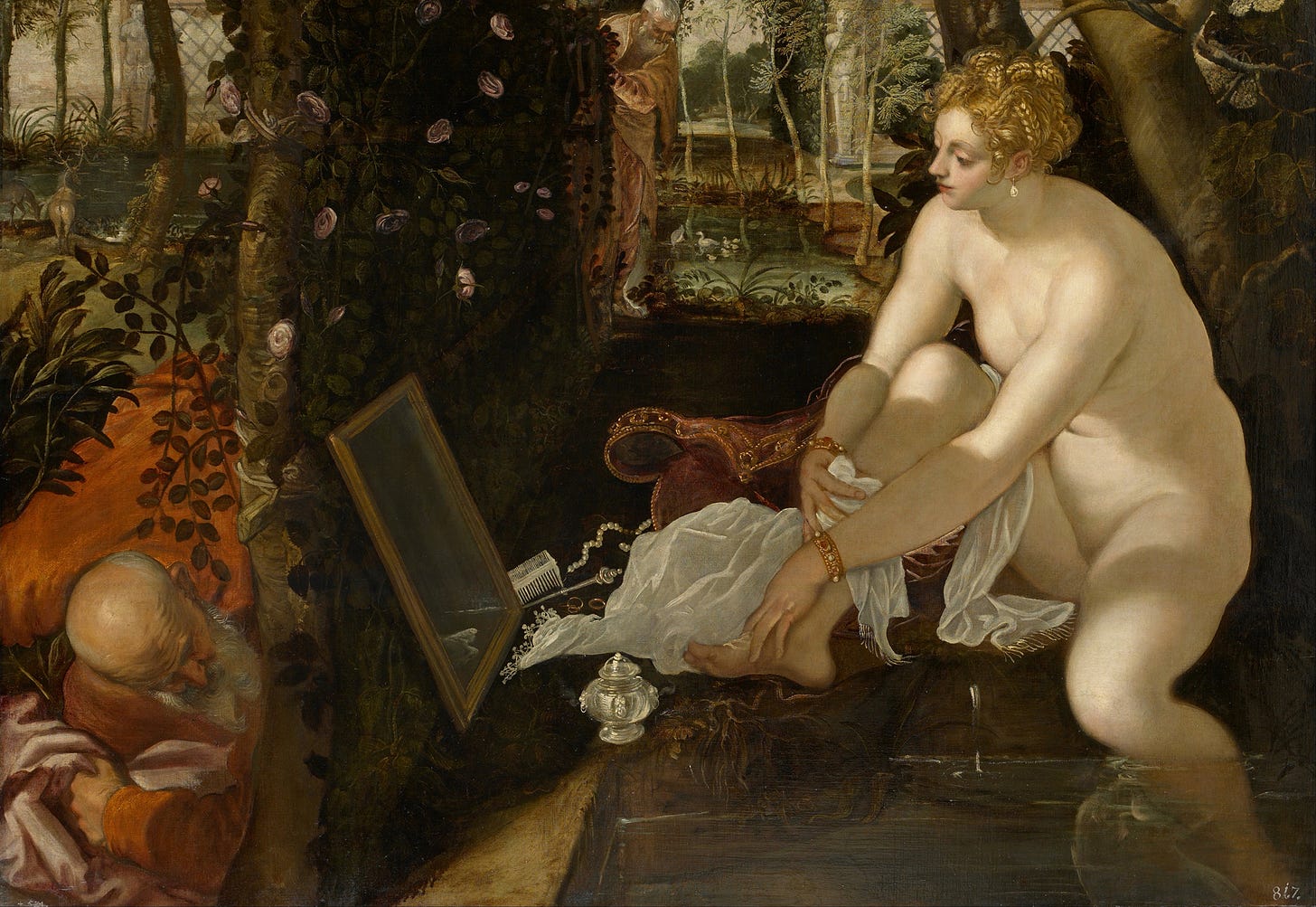Hello gang! From now on I’m going to post a little later in the day, mostly for my own sake, since the early morning schedule made me unreasonably anxious I was going to miss my last minute checks. The human mind is a RIDICULOUS thing!
Today we finish chapter two, up to the charming line “He sidestepped a sword-waving urchin, carefully avoided a urinating mule, and reached the Sedara’s door” on page 66 of the Vintage Classics paperback edition.
Dinner night
Fabrizio’s perfect stay in Donnafugata continues with another ritual designed to make him feel like a magnanimous but still powerful Prince: a rich dinner, perfectly catered to the needs and tastes of his provincial subordinates, with himself as head of the table, family and estate. A dinner to prove that nothing has changed; but, as we keep learning, a lot of has changed indeed, and Fabrizio’s carefully planned night will be turned upside down by those same forces that have already revolutionized the world, namely, the dreaded nouveau riche. The main characters become extras at their own table, the sober occasion turns into something of a farce or a steamy romance. We’ll look these characters up close in a moment, but first, spare a thought for poor Father Pirrone; earlier today he found himself face to face with the naked Principone, and tonight here he is, sitting right next to hormonal teenagers, thinking unbecoming thoughts.
Calogero, the fool
Mayor Sedàra’s appearance causes a whirlwind of uneasy hilarity. The simple dress code for the meal, chosen to not embarrass his humble guests, has the opposite, catastrophic effect of humiliating the Prince himself, when a clearly out-of-his-depth don Calogero shows up—dreadful sight!—in a tailcoat.
“No laugh, though, came from the Prince on whom, one might almost say, this news had more effect than the bulletin about Garibaldi’s landing at Marsala. That had been an event not only foreseen but also distant and invisible. Now, with his sensibility to presages and symbols, he saw revolution in that white tie and two black tails moving at this moment up the stairs of his own home. Not only was he, the Prince, no longer the major landowner in Donnafugata, but he now found himself forced to receive, when in afternoon dress himself, a guest appearing in evening clothes.”
The man who stood stoic as Garibaldi invaded his lands receives a mortal blow at the sight of two white glows and a white tie. He’s quick to notice that don Calogero’s attire is disastrously cheap and unrefined, and that allows him to feel superior, still. The mayor might be richer than him, but he doesn’t have style! His victory is even more short-lived if your consider that today the vast majority of people don’t even know the difference between afternoon and evening clothes and bespoke tailoring survives only as a niche interest. Calogero the capitalist, the shrewd businessman with his tragic suit, was always going to have the last laugh; his apparent faux pas is only another omen for Fabrizio and the aristocracy.
Angelica, the seductress
The first thing we learn about Angelica is that she makes the Prince wait, like King Ferdinand did, to assert her own importance. Angelica’s entrance at villa Salina is long planned and choreographed, she ignores the men and goes to greet the lady of the house, she deliberately omits the “Excellency.” The world is a stage and by God she will grab that main role! It’s all bravado, she’s shaking with tension, and it’s easier for us to sympathize then, to look beyond the air-headed flirting and the lascivious looks from men young and old, to see a 17-year-old during her first big night out, intoxicated by the glittering dinner and the power of her own beauty; so bold and yet so naive.
Angelica’s presence is a second, even more revolutionary blow against Fabrizio’s crumbling reality: times have changed so much that a low-born girl can use her good looks and her father’s common money to dominate the scene. A girl that once upon a time could have ended up like Mariannina, prey to a Prince's whims, has now the power and legitimacy to sit at the Prince’s table, sideline his daughter and marry his nephew. Sexuality becomes a weapon, the victim becomes perpetrator. Fabrizio and his world are conquered by a teenager's crude flirting and by their own animal instincts.
Angelica’s presence stirs, perturbs, transforms. The rich flavors of the meal become even more sensual, almost aphrodisiac, everyone is high on pheromones. Angelica laughs with naive eyes and pointed teeth; a new predator roams the jungle.
Concetta, the scorned
Concetta is having a very different night from everyone else. Her romantic dreams have been crushed by Angelica’s presence and by Tancredi being Tancredi; alas, she’s not the wholesome heroine of a Victorian novel, she won’t win back her beloved from the clutches of a vapid enemy. While the others bask in Angelica’s sensuality the feral Leopardess contemplates violence.
“Concetta had an intuition, an animal intuition of the current of desire flowing from her cousin towards the intruder, and the little frown between her nose and forehead deepened; she wanted to kill as much as she wanted to die.”
Like her father zeroes in on Don Calogero’s abysmal tailcoats, she clings to to Angelica’s moles and the food stuck in her teeth, just like her father she claims the moral high ground. Both Fabrizio and Concetta have already lost, they’ve already been mortally wounded by these barbarous strangers. And yet Fabrizio barely spares a thought for Concetta, his flesh and blood, his striking mirror image. If he does, it’s only to wish that her pain would go away and leave him in peace.
Angelica’s triumph is public. Concetta’s tragedy goes private, silent, unnoticed.
Tancredi, the shallow
What can I say about Tancredi, except that the narrator’s perpetual disappointment in him really amuses me? He’s still wearing an eye-patch he doesn’t need, he’s still flirting with every lady that breathes in his general direction. Angelica’s dazzling arrival brings out the best, which is to say the worst, in him.
“[Tancredi] was letting himself be drawn along by the physical stimulus of a beautiful woman to his fiery youth, and also by the (as-it-were) numerical excitement aroused by a rich girl in the mind of a man ambitious and poor.”
Tancredi forgets all his high breeding and launches in a rather tasteless story about soldiers and nuns that excites Angelica and enrages Concetta. Keep the tale of young Tassoni in mind, we’ll come back to him later.
The day after Tancredi, in a last attempt to have his cake and eat it too, tries to charm his way back into Concetta’s good graces and is promptly gutted by his blood-thirsty cousin. Who knows what could have happened, hadn’t Concetta been so proud? Can a Leopard ever not be proud? Resentment gives the final push Tancredi needs, adding to his lust and pecuniary woes. He goes home, steals his uncle’s German peaches and, the last we see of him, he’s marching right up to Angelica’s door. The very peaches that (as we saw last week) are a metaphor for lawful marriage. We can already guess what Tancredi’s goal is.
Fabrizio, the (real) fool
Dinner has been a disaster, what was supposed to be a show of strength has ended up diminishing the Prince’s importance even further. Fabrizio realizes it only at night, when not even his beloved stars can console him and he sees doom spelled in the skies. He wishes he was an unfeeling soul doing math among icy constellations. He wishes he was like Bendicò, a perfectly happy body without any moral quandaries. But he is both body and soul, and the two cannot make peace. “Lord grant me the strength and the courage to contemplate my heart and my body without disgust.”
Morning brings its usual respite. His visit to the Convent of the Holy Ghost is so dull and edifying there is no chance of drama or anxiety; those old Nuns might make him wait too, but their bit of theater is welcomed, their choreography is an old, tested one. Naive, uncomplicated faith. For one morning, Fabrizio resurrects the simple glory of his ancestors.
The Holy Ghost is based on a real Benedictine monastery in the town of Palma di Montechiaro, it’s identical down to the letter the Devil allegedly wrote to Tomasi’s saintly ancestor. Today it’s almost impossible to visit the monastery, but the cloistered nuns will still sell you almond cakes through the wheel that once upon a time collected foundlings.
Fabrizio enjoys his visit, blessedly unaware that Concetta, whose agony he’s pointedly ignoring, has already sent Tancredi right into Angelica’s exquisite—but common— arms. The whole affair disgusts him, really. But how can he call his nephew an hypocrite, when he himself has been lusting after Angelica? How can he deny him this marriage, when the lad is so ambitious and so poor? He has opened his house to the enemy, he will welcome them in his family too. Out of guilt, out of inertia. And he will hate them and loathe himself the whole time.
We’re finished with chapter two! Our Donnafugata adventures will continue next chapter, and boy will they be fun! Well, Fabrizio will NOT have fun, but we’ll get to laugh at him. Next week we’re reading until page 82, up to the line “By eight o’clock all was over, and nothing remained except darkness as on any other night, always.” It’s slightly longer than usual, I’m going to do my best to finish the book by the end of the year. And I’ve got my ideas about what to do next, but tell me, are there any Italian books or authors you’d be curious to explore?
Till next time!











Concetta day dreaming of poisoning, wanting to kill….does not bode well.
First, I want to clarify about the pasta. It's written that there was a cheese crust with cinnamon and sugar on top, but the pasta itself underneath this crust was with meat and not sweet. Is it common to make a sweet cheese crust?
I really liked the image of the stars, where Fabrizio imagines a face made of stars looking down at him. I wonder, is this some kind of ancient god for him? And the fact that for Fabrizio his dog is like a celestial deity is actually very sweet. I have a dissonance in Fabrizio's image here - I've always perceived that people who are kind to animals are good. But in theory, Fabrizio is only kind to his dog. And although this makes him very likeable to me, I still can't see him as a real dictator and tyrant.
The correspondence of the blessed Corbera with the devil and the display of their letters is something else. Such formal relations with the devil himself, and he politely replied to her. Amazing.
And Concetta - well done in this chapter. I hope her infatuation with Tancredi will pass. Her sarcasm and joke about "knocking down" the monastery doors with a log. That story at dinner disturbed me, it's immediately clear that Angelica doesn't understand the horror of what's happening there at all.